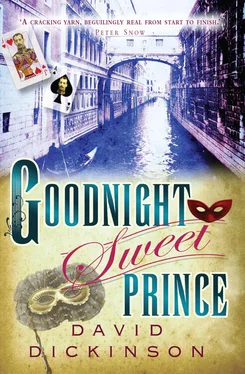David Dickinson - Goodnight Sweet Prince
Здесь есть возможность читать онлайн «David Dickinson - Goodnight Sweet Prince» весь текст электронной книги совершенно бесплатно (целиком полную версию без сокращений). В некоторых случаях можно слушать аудио, скачать через торрент в формате fb2 и присутствует краткое содержание. Жанр: Исторический детектив, на английском языке. Описание произведения, (предисловие) а так же отзывы посетителей доступны на портале библиотеки ЛибКат.
- Название:Goodnight Sweet Prince
- Автор:
- Жанр:
- Год:неизвестен
- ISBN:нет данных
- Рейтинг книги:4 / 5. Голосов: 1
-
Избранное:Добавить в избранное
- Отзывы:
-
Ваша оценка:
- 80
- 1
- 2
- 3
- 4
- 5
Goodnight Sweet Prince: краткое содержание, описание и аннотация
Предлагаем к чтению аннотацию, описание, краткое содержание или предисловие (зависит от того, что написал сам автор книги «Goodnight Sweet Prince»). Если вы не нашли необходимую информацию о книге — напишите в комментариях, мы постараемся отыскать её.
Goodnight Sweet Prince — читать онлайн бесплатно полную книгу (весь текст) целиком
Ниже представлен текст книги, разбитый по страницам. Система сохранения места последней прочитанной страницы, позволяет с удобством читать онлайн бесплатно книгу «Goodnight Sweet Prince», без необходимости каждый раз заново искать на чём Вы остановились. Поставьте закладку, и сможете в любой момент перейти на страницу, на которой закончили чтение.
Интервал:
Закладка:
‘Perhaps they should sing an aria together in our opera of Eduoarde and Louisa . The Murderers’ Duet . They could be sharpening their knives on the steps of the Duomo, pricking their fingers so they can splatter blood all over their nice white shirts.’
‘I think we may become rich from this opera,’ said Powerscourt diplomatically. ‘But let me ask you a question. Suppose you were English. Suppose you wanted to murder Lord Gresham. You know he is going to be in Perugia. Could you hire a gang of killers here, to do your murder for you?’
‘I think you could, if you were in Palermo. Or if you were in Naples. Maybe even in Rome.’ Ferrante was thinking carefully about what he was saying. ‘In Perugia, no. I think not. Of course we have murderers. But these are the citizens murdering each other for love or betrayal or passion or whatever they do these things for. In Perugia we do our own killing. We don’t ask outsiders to come and do it for us. And anyway, who in Perugia would want to kill the Lord Gresham? Nobody even knows who he is. We couldn’t find out who he was until you came.’
‘So your experience tells you that somebody outside the city must have come to find him. And then to kill him.’
‘Exactly so, Lord Powerscourt. And there is something else.’
Ferrante walked to the front of their alcove to check there was nobody listening. He came back with more coffee.
‘We have found a weapon. It may be the one used to carve the Lord Gresham’s throat. It is long and very sharp. We found it in the corner of the piazza about one hundred yards from the fountain. There is something special about this knife. I tell you what it is in a moment.
‘My men, they go round all the butchers’ shops, all the cafes, all the restaurants, all the hotels, all the big private houses where a cook might use such a knife. Ordinary people like the Mrs Ferrante, I tell you, she would not have such a thing. There is no need. My men, they ask these cooks and butchers if anybody has lost a knife. Or if they recognize the one we find by the fountain. They do not. This knife, it is a stranger in Perugia, a foreigner.
‘And in the very small letters, along the blade, it says Made in Sheffield. Now, we do not know if this is the murder weapon. But it may be. And it may have come all the way from England. I know the Sheffield steel is famous, but here in Perugia, nobody buys the knives made in England. They buy the knives made in Italy, or in Germany, or in France. Not the knives from Sheffield.’
Ferrante paused. He smiled at Powerscourt. ‘Let me try to sum up for you, Lord Powerscourt, where you stand. Then you have to do it for me. They make us play this game in the police college. Sometimes it is very good.
‘You come to find out if it is Gresham in the fountain. In your heart you think it is, even before you see him. So, you find him. In your heart also, I think you know who killed him. Not necessarily the name of the person. Maybe someone tells somebody else to do it for them. Maybe the killer is obeying orders. I think you know that this killer, the killer of Gresham, may have gone back where he came from, probably to England. True?’
‘Very good,’ said Powerscourt. ‘Now let me try.’ Ferrante was eating the last of the lemon cakes very very slowly, one tiny mouthful at a time. Powerscourt hoped Mrs Ferrante made some of them for him at home. ‘You have a body in the morgue. You did not know who it was. Now you do. You also know, I think, that the murderer will not strike again here in Perugia. The reason he came was simply to murder Gresham. He has done that. Now he has probably gone back where he came from. He may have left his murder weapon behind him. You could close your case, Captain Ferrante. Your report could say Lord Gresham was murdered by an English killer, sent here for the purpose. By the person or persons unknown. Your case is closed.’
‘I think you are right, Lord Powerscourt. I can close my case. But I wonder where the murderer may strike again. Take care, my lord. These are very dangerous people with the sharp knives. But, come. We must go and see the fountain before it gets dark. And we must think some more about our opera. Maybe we become like those English people, Sullivan and Gilbert? Powerscourt and Ferrante.’
Captain Ferrante hummed a little tune to himself.
‘The beginning, I think I have the beginning. It is in an old English castle at sunset. There is the Lord Gresham, sitting on his battlements, sick with love for his Louisa. He looks out to the great lake in his grounds. She is coming to him in a boat. He cannot see her yet. Listen. He begins to sing . . .’
27
‘Don’t look back. Don’t look round. Not yet anyway.’
Captain Ferrante was leading the way along the Via del Priori that joined the hospital and the morgue in the university district to Perugia’s main square. ‘I think we are being followed. I have thought it for some time.’
He looked across at Powerscourt. Powerscourt seemed more interested in a couple of very old Italian ladies, bent almost double, their bags of vegetables trailing along the road, streams of Italian pouring towards the pavements.
‘Can you tell if they are Italian or English?’
‘I cannot. They are a quick sight in a doorway here, a drawing back into the shadows there. The brown coat, I think. Sometimes the hat, sometimes not. Have you been followed before, Lord Powerscourt?’
‘I have, Captain Ferrante. But that was many years ago in India.’
Delhi, was it, or Calcutta? Delhi, he thought. And it was so difficult, he remembered, because there were so many people, so many faces that looked at you automatically if you were a white man. But only two of them were following you with knives, following the Englishman, one of the rulers. He remembered the urge to run, to get away from his pursuers as fast as possible, to sprint across the Maidan and disappear into some Government building and the safety of its files. A white man’s building, a ruler’s building. In there you would be safe. And then the knowledge that to run was to make yourself even more conspicuous, more visible still.
‘Well, we must think what to do about it. Or who it might be. Do you have any idea who it might be, Lord Powerscourt? Come, we shall talk of it later in your hotel. See, here is the Piazza IV Novembre. And here is the fountain where they find the body.’
On their left stood the Cathedral of San Lorenzo, the outside still unfinished after four hundred and fifty years. To their right the handsome Palazzo dei Priori with fine windows and Gothic sculptures, chains and bars of gates serving as memorials of ancient victories over Perugia’s enemies. Stretching away towards the Piazza Vittorio Emanuele, the Corso Vannucci, named after Pietro Vannucci, Perugia’s most famous painter, Perugino. A great statue of King Vittorio Emanuele Due himself stood in the piazza. Powerscourt wondered if anybody had counted the numbers of statues of this Vittorio Emanuele all across his newly united country. He was always on his horse. He was in every major town and city in Italy, looking down on his people. Sculptors must have built their own memorials to him, so much business had he brought.
The fountain rose in three graceful tiers, a pair of twenty-four-sided pools topped by a bronze basin.
‘The people come to look at this fountain from all over the world,’ said Ferrante sadly. ‘Always, I think, they tell of the sculptures round the side, the delicate workmanship of the craftsmen, the little statues that show the heroes of Perugia’s history. They forget what it meant to the people of the city. They come here to get the fresh water. They come to do the washing in the little pools. I am sure all that was much more important to the people six hundred years ago than the sculptures. Fresh water on top of this hill, they must have thought it came from God.
Читать дальшеИнтервал:
Закладка:
Похожие книги на «Goodnight Sweet Prince»
Представляем Вашему вниманию похожие книги на «Goodnight Sweet Prince» списком для выбора. Мы отобрали схожую по названию и смыслу литературу в надежде предоставить читателям больше вариантов отыскать новые, интересные, ещё непрочитанные произведения.
Обсуждение, отзывы о книге «Goodnight Sweet Prince» и просто собственные мнения читателей. Оставьте ваши комментарии, напишите, что Вы думаете о произведении, его смысле или главных героях. Укажите что конкретно понравилось, а что нет, и почему Вы так считаете.












